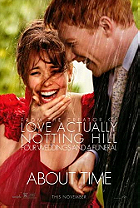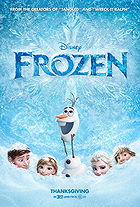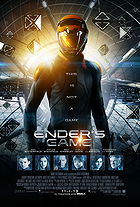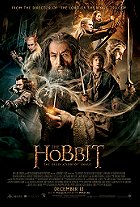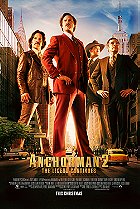With film studios now desperately throwing as many brand-name characters at the wall to see who sticks, it's Jack Ryan's turn to get another look-in. An iconic character from various novels by the late Tom Clancy, Ryan has previously appeared on-screen in four action-adventures, portrayed by Alec Baldwin, Harrison Ford and Ben Affleck to varying degrees of success. With Star Trek actor Chris Pine now assuming the role, and with a completely original story in place not based on any pre-existing material, 2014's Jack Ryan: Shadow Recruit is a confident resurrection of the unique character, who's right at home in today's new high-tech world. Shadow Recruit is not as solid as Patriot Games (the best Ryan film) or The Hunt for Red October, but it's better than the character's other two cinematic outings, which is largely thanks to director Kenneth Branagh (last seen in mainstream waters with 2011's Thor), who creates an exciting ride despite the occasional dollop of Hollywood dopiness.

While studying in London, Jack Ryan (Pine) witnesses footage of the September 11 attacks on TV, which inspires him to quit college and serve his country in the Marine Corps. Suffering a crippling back injury in Afghanistan, Jack soon catches the attention of CIA Agent Thomas Harper (Kevin Costner), who's impressed by the young man's tenacity and intelligence, and subsequently talks him into joining the service. Ten years on, Jack is a junior analyst in the CIA, working undercover on Wall Street as he studies financial patterns that might reveal terrorist activities. Upon discovering a rather peculiar list of bank accounts hidden in Russia, Jack is pushed to go into the field himself, travelling to Moscow to investigate what could be a plot to cripple the United States economy. It's not long before Jack becomes a hunted man, evading assassination attempts and becoming drawn further and further into the case. With the assistance of Harper, Jack turns his investigation towards Viktor Cherevin (director Branagh), a ruthless businessman at the centre of the conspiracy. Meanwhile, Jack also reluctantly accepts help from his live-in girlfriend Cathy (Keira Knightley), who has been kept in the dark about his true profession.
Although the trailers for Shadow Recruit have portrayed the film as a Jason Bourne-esque thriller featuring Jack as a confident man of action, the result is smarter than anticipated. Ryan doesn't set out to kill as many people as possible, engaging in fisticuffs and disarming opponents only when the occasion calls for desperate measures. Hell, after his first kill, he can't stop shaking. Jack is, for the most part, an analyst, relying on his intellect and very reluctantly agreeing to fieldwork, which works in the movie's favour. Indeed, Jack as written by Clancy was never much of an action hero, hence this treatment of the character is respectful to the source. To be sure, Shadow Recruit is admittedly marred by more than a modicum of action film silliness which isn't really needed. Not to mention the plot isn't exactly imaginative. In fact, conceiving of an original story for the flick seems unnecessary considering the wealth of material that could be mined from Clancy's novels.

For an action-thriller, Shadow Recruit is surprisingly low-key. Produced for a modest $60 million, its scope is limited and there are no enormous action sequences beget with explosions. Branagh is more concerned with mining excitement from Jack's covert activities, or from an intense chase through Moscow. Even more enjoyable is a scene in which Jack, Cathy and Viktor sit down for a dinner of deception and cunning. Shadow Recruit is for the most part a slick ride, with Branagh maintaining a steady pace throughout which helps to compensate for the picture's more contrived moments. The polished presentation is a huge plus, and it's supplemented with a perfectly exciting score courtesy of Patrick Doyle.
Pine is not exactly a remarkable thespian, but he's a robust Ryan and a suitable pick for this new portrayal of the character. Even though he doesn't seem to age over the ten years between Jack quitting college and becoming a CIA analyst, he carries himself well, with commanding charisma and believable swagger. Pine also shares solid chemistry with Knightley as Cathy, though the British actress' American accent is somewhat on the iffy side. The script does well by treating Cathy as a smart female lead; she's understanding and acts believably, and she is given more to do in the grand scheme of things than look pretty and be a damsel in distress. Meanwhile, as Jack's mentor, Costner is firmly within his comfort zone, and there's nothing wrong with that. The veteran is a warm presence, and it's nice to see the talented actor still appearing in theatrical movies. Director Branagh is also in fine form as the villain here. Espousing a believable Russian accent and emanating plenty of gravitas, Branagh is a hugely charming presence, and his villainy is not as cut-and-dried as it may have been in a less sophisticated blockbuster.

Jack Ryan: Shadow Recruit is a somewhat rocky ride, but it's a promising set-up for what could be an exciting new series. It simply feels a bit too slight and lacking in novelty in the grand scheme of things, coming off as nothing too special. But with that said, when you consider all the crap that movie-goers are accustomed to receiving during the month of January, Shadow Recruit is head-over-heels above the rest. It's pleasant, serviceable popcorn entertainment for adults, and it feels relevant in today's shaky economic climate. Maybe if another instalment materialises, the series will find its groove and genuinely soar to excellence...
7.1/10
 Login
Login
 Home
Home 183 Lists
183 Lists 1674 Reviews
1674 Reviews Collections
Collections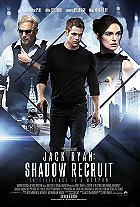
 0 comments,
0 comments, 